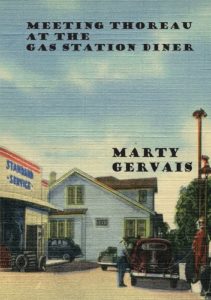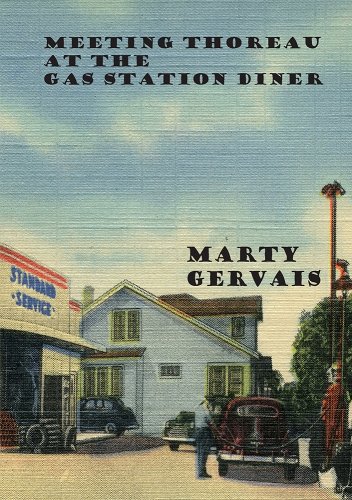 by Shelley McAneeley
by Shelley McAneeley
Meeting Thoreau at the Gas Station Diner
by Marty Gervais
Urban Farmhouse Press (2022)
In the mid-to-late sixties, hippies and curious seekers took off to wherever, whatever, and however. It was a time of expansion. Strongly motivated to explore the world, new cultures, and discover the meaning of life, they flocked across the continents. They had the constitution to do without food, sleep, a clean bed, and clothes, and enough bravery to indulge the odd behaviours of whoever they landed with. The public and government had gone crazy: Vietnam, Chicago Seven, and other mind altering events were in full swing. It was a time of sex, drugs, rock’n roll, and a time of intrigue and slayings: JFK, Martin Luther King, and Malcom X, were just a few.
Marty Gervais’ journey in Meeting Thoreau at the Gas Station Diner starts with a metaphorical loop in time with the beating of rain on the car windshield and the endless historic refrain of heroes passing most unnaturally.
It wasn’t until we were passing
through Thunder Bay already dark
as we slipped by sleepy neighbourhood porches
and flickering lights of night time diners
and that’s when I heard the news on the the car radio
about Martin Luther King being shot dead
on a balcony outside his second-floor room
at the Lorraine Motel in Memphis
and the four of us fell silent inside the car
listening to the news, and the blunt
and endless refrain of the wipers
on a rainy windshield.
(10, That Summer on the Road)
Clear, pulpy, and honest, Gervais’ poems align with the psyche of an entire generation. Gervais sets out with determination to fulfill the Canadian motto, from “sea to sea” and to hitchhike from Pacific to Atlantic. He is set free from a failed relationship and flees with the astounding wealth of sixty-five cents in his pocket and two books: Thoreau’s and Gary Snider’s.
… the two of us, then, one after the other
stripped and stepped into its steamy
warmth and sat down in the bare-bulb glow
of this place in the woods, my first bath
in maybe weeks, cross-legged
opposite this woman, a stranger only
a few days ago, and we talked.
(26, The Bathtub)
Early on, and despite his Catholic upbringing, Garvais surprises himself with a newly gained insights into relationships. He allows himself to be in the moment, with no past or future, just an immediate presence. After the heart break of an earlier romance the road is a salve that helps him move on. He gains more mental flexibility as he thumbs from driver to driver and concedes to each circumstance. He encounters nonstop talkers and accepts random acts of kindness when driven miles out of the intended destination.
Gervais slides from one province to the next not clinging to anything, he just notes his circumstances. His eloquent descriptions leave me feeling as though I am experiencing the sunset or feeling the cool of the Bow River across my feet. His poems are immediate and palpable and capture the essence of the era.
…as the sun desperately fought to untangle
itself from the clouds like a deer fly
struggling to exit a spider’s web
(33, Cold Morning on the Bow River)
Inspired by Gervais well-presented poems and stories, I want to put on my hiking boots and head out without a TripTik, and expand my horizons.
Shelley McAneeley ponders art in its many forms. You can enjoy some of her poems in Drifting Like A Metaphor, edited by Micheline Maylor and available through Frontenac House.


